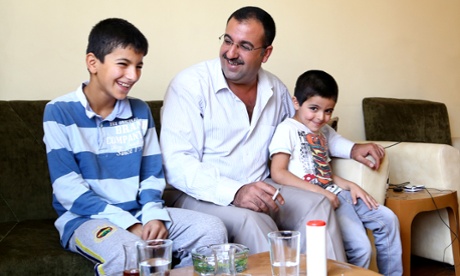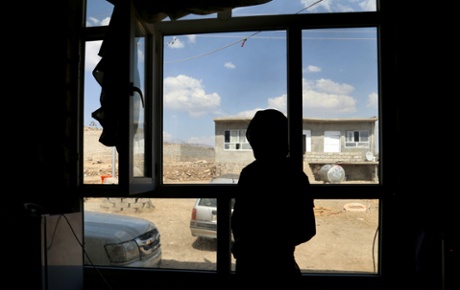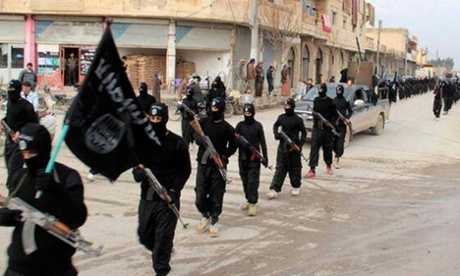
The house was under surveillance for several days. There were seven women inside, all captives of Islamic State (Isis), human bounty picked up during their rampage through Yazidi-dominated areas of northern Iraq last summer.
The captors were Australian-born. The reconnaissance team was part of a network of freelance rescuers built up by a Yazidi Iraqi known as Abu Shujaa, whose name translates as “father of the brave”. So far the Isis assault on Yazidi men, women and children had been all one way, but now he intended to strike back.
When the Australians left the house in the evening, he gave the go-ahead.
“Two of our men went inside the house and three others stood guard around the area, monitoring the situation,” said Abu Shujaa, who oversaw the meticulously-planned operation from a nearby house in the city of Raqqa. “We quickly took the women to a safe house in Raqqa province and kept them there overnight. Next day, we got them to Gaziantep in Turkey.”
On his own way out of Raqqa, he had a nasty surprise – an Isis checkpoint. “I was lucky they did not ask any questions,” he said.
Abu Shujaa has become something of a legend among his Yazidi community. He runs an underground network across Syria to free Yazidis kidnapped by Isis. The group is believed to have taken hundreds of women and children hostage during a bloody assault on the Sinjar area of western Iraq last August.
The jihadis have kept the women as concubines or sex slaves. Boys are indoctrinated and those able to carry guns are trained to fight.
Abu Shujaa used to be a local merchant in Sinjar before the Isis assault, occasionally crossing the border into Syria on business. He is not willing to discuss the line of work he was in, but says it was instrumental in developing the network of people he currently manages.

He was given his nickname while still a young man. Under Saddam Hussein’s rule he made illegal trips into Syria , the first when he was 18. Had he been caught, it may have cost him his life. He named his youngest son Shujaa too at the request of his friends.
Abu Shujaa occasionally posts images and video of some of the people he has rescued on a Facebook page. One post shows an Isis propaganda image featuring a Yazidi boy aiming a pistol at the camera. In a subsequent post dated 10 June, he posted a photograph of himself with the same boy, after he was rescued, still dressed in the same Isis-style gown.
Each of Abu Shujaa’s cells consists of between three and seven people and a number of safe houses across Isis-occupied territory in Syria. Six months ago, Isis caught and decapitated two members and placed their heads on poles in the middle of a roundabout in Raqqa, he said.
“We have to do everything with utmost secrecy or we will be gone. The world has not really cared about us. We have no one to protect us. We have to get our people out by ourselves.”
He has made four forays into Isis-controlled areas of Syria since his network first embarked on their ambitious missions.
These activities have not gone unnoticed by Isis. In one threatening message sent to him, a Tunisian jihadi in Syria lays his hatred bare.
“You are corrupt. You, enemy of God … you will be a loser in this world and the afterlife. Your fate will be hell,” the audio message said.
Abu Shujaa shrugs at the invective, and drags on a cigarette.
“The extent of the Yazidi catastrophe was so huge that it pushed me to do this,” he said, describing Isis’s slave trade in women, in which captives are bought and sold for $1,000 or more, depending on their age, beauty and whether they are virgins on not.
“There needs to be someone to try to get them out. It doesn’t mean I’m better or braver than the rest. I know people [in Syria] and had a network of contacts there even before [Isis] came,” he said.

Abu Shujaa claims his network has freed 200 Yazidis, a figure that is hard to corroborate. Those he has saved naturally sing his praises.
Isis militants abducted Samira, 21, and her two-year-old son in August last year. Her husband and 12 members of his family are still missing. She was pregnant when she was kidnapped, and gave birth to a daughter in captivity.
After being kept in western Iraq for more than two months, she was transferred by bus to Raqqa along with about 30 other young women and girls. There she was given to a Saudi Isis fighter.
She was forced to convert and prayed regularly in an effort to appease her captor.
“One day in April, the Saudi guy said: ‘I will send you back to your family if they pay me 70m Iraqi dinars [£38,000]’,” Samira told the Guardian from her current home in Iraqi Kurdistan. “I put him in touch with my father and they finally agreed on 20m dinars.”
The militant received an advance payment of 10m dinars, but then refused to honour the deal. Dismayed, Samira’s father Hassan contacted Abu Shujaa.
“Abu Shujaa said if she calls next time, just make sure to arrange for me to speak to her on the phone for two minutes and I will get her out,” he said.
Hassan resumed his contact with his daughter’s captor via social media. The Guardian saw the correspondence, in which the militant sometimes cursed and threatened him, and occasionally shared images of crucified men.
When Abu Shujaa finally got a chance to talk to her, posing as a family member, a plan was set. One hot day in June when her captor was out, Samira walked outside his home with her two children, dressed in a black abaya. A member of the rescue network pulled over, bundled her into a car and drove her away.
Along with another rescued family, Samira and her two children were taken east out of Isis-controlled territory.
“I always thought there was no way in the world I’ll ever meet my family again,” Samira said, holding back tears. “But Abu Shujaa and his men brought me back. I met Abu Shujaa near the Iraqi border … I can’t really describe what a great thing they are doing.”
Figuring Samira had perhaps returned to her family in Iraq, her former captor sent a message to Hassan in mid-June asking to speak to her.
He never got a reply.
- This article was amended on 13 July 2015. The headline originally described Abu Shujaa as a Yazidi Christian. The two are separate religions and Abu Shujaa is a Yazidi. In addition, the introduction talked of Isis militants’ “rampage through Christian areas of northern Iraq last summer”. It should have referred to Yazidi-dominated areas. It also said the operation to rescue seven women was overseen from a house in the nearby city of Raqqa, when it was overseen from a nearby house in Raqqa. Finally, the picture caption of Abu Shajaa with his sons mixed up the boys’ names. These errors have been corrected.







